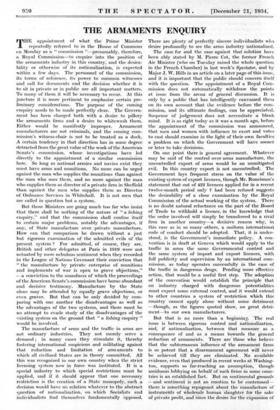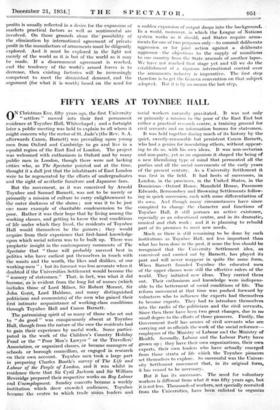THE ARMAMENTS ENQUIRY
Irappointment of what the Prime Minister epeatedly referred to in the House of Commons on Monday as a " commission "—presumably, therefore, a Royal Commission—to enquire into the position of the armaments industry in this country, and the desira- bility or otherwise of its nationalization, is expected within a few days. The personnel of the commission, its terms of reference, its power to summon witnesses and call for documents and the decision whether it is to sit in private or in public are all important matters. To many of them it will be necessary to recur. At this juncture it is more pertinent to emphasize certain pre- liminary considerations. The purpose of the coming enquiry needs to be made perfectly clear. The Govern- ment has been charged both with a desire to pillory the armaments firms and a desire to whitewash them. Either would be manifestly improper. Armament manufacturers are not criminals, and the coming com- mission's witness-chair is not to be treated as a dock. A certain tendency in that direction has in some degree detracted from the great value of the work of the American Senate's commission, whose investigations have led directly to the appointment of a similar commission here. So long as national armies and navies exist they must have arms and munitions. No more can be urged against the man who supplies the munitions than against the man who uses then, and no more against the man who supplies them as director of a private firm in Sheffield than against the man who supplies them as Director of Ordnance Services in Whitehall. It is not men that are called in question but a system.
But those Ministers are going much too far who insist that there shall be nothing of the nature of " a fishing enquiry," and that the commission shall confine itself to certain major problems, notably the advantages,- if any, of State manufacture over private manufacture. How can that comparison be drawn without a just but rigorous examination of the admitted evils of the present system ? For admitted, of course, they are. British and other delegates at Paris in .1919 were not actuated by mere nebulous sentiment when they recorded in the League of Nations Covenant their conviction that " the manufacture by private enterprise of munitions and implements of war is open to grave objections," —a conviction to the soundness of which the proceedings of the American Senate's commission have borne abundant and decisive testimony. Manufacture by the State alone may be attended by equally grave objections, or even graver. But that can be only decided by com- paring with one another the disadvantages as well as the advantages of the two systems, and there must be no attempt to evade study of the disadvantages of the existing system on the ground that " a fishing enquiry " would be involved.
The manufacture of arms and the traffic in arms are not ordinary industries. They not merely serve a demand ; in many cases they stimulate it, thereby fostering international suspicions and militating against that reduction and limitation of armaments to which all civilized States are in theory committed. All this was recognized in our own country when the strict licensing system now in force was instituted. It is a special industry to which special restrictions must be applied, and if it should appear that one necessary restriction is the creation of a State monopoly, such a decision would have rio relation whatever to the abstract question of nationalization, on which Socialists and individualists find themselves fundamentally opposed. There are plenty of perfectly sincere individualists who desire profoundly to see the arms induStry nationalized.
The case for and the case against that solution have been ably stated by M. Pierre Cot, the foririer French Air Minister (who on Tuesday raised the whole question in the French Chamber) in last week's Spectator, and by Major J. W. Hills in an article on a later page of this issue, and it is important that the public should concern itself with the question. The appointment of a Royal Com- mission does not automatically withdraw the points at issue from the arena of general discussion. It is only by a public that has intelligently canvassed them on its own account that the evidence before the com- mission, and its ultimate findings, can be appreciated. Suspense of judgement does not necessitate a blank mind. It is as right today as it was a month ago, before the appointment of the commission was announced, that men and women with influence to exert and votes to cast should examine in the light of their own faculties a problem on which the Government will have sooner or later to take decisions.
On one point there. is general agreement. Whatever may be said of the control over arms manufacture, the uncontrolled export of arms would be an unmitigated evil. In this country export is not uncontrolled. The Government lays frequent stress on the value of the existing system of export licences, though Mr. Runcirnan's statement that out of 422 licences applied for in a recent twelve-month period only 7 had been refused suggests the desirability of a close examination by the Royal Commission of the actual working of the system. There is no doubt natural reluctance on the part of the Board of Trade to withhold a licence, in the knowledge that the order involved will simply be transferred to a rival firm in another country—a decisive reason why, in this case as in so many others, a uniform international code of conduct should be adopted. That, it is under- stood, is the Government's immediate policy. A con- vention is in draft at Geneva which would apply to the traffic in arms the same Governmental control and the same system of import and export licences; with full publicity and supervision by an international com- mission, as today operates successfully in the case of the traffic in dangerous drugs. Pending more effective action, that would be a useful first step. The adoption of the convention would establish. the principle that an industry charged with dangerous 'potentialities must expect some external control, and it would extend to other countries a system of restriction which this country cannot apply alone without some detriment —though, as the figures quoted show, no great detriL ment—to our own manufacturers.
But that is no more than a beginning. The real issue is between rigorous control and nationalization, and, if nationalization, between that measure as a consequence of and as a means towards the general reduction of armaments. There are 'those who believe that the subterranean" influence of the armament firms is so potent that a disarmament agreement will never be achieved till they are eliminated. No available evidence, even that produced in recent weeks at Washing- ton, supports so far-reaching an assumption, though assiduous lobbying on behalf of such firms in some coun- tries is an established fact. But on sentimental grounds —and sentiment is not an emotion to be contemned— there is something repugnant about the manufacture of instruments of wholesale human slaughter for the sake of private profit, and since the desire for the expansion of profits is usually reflected in a desire for the expansion of markets practical factors as well as sentimental are involved. On those grounds alone the possibility of the elimination by international agreement of private profit in the manufacture of armaments must be diligently explored. And it must be explored in the light not merely of the world as it is but of the world as it may be made. If a disarmament agreement is reached, and the tendency of the world's armed forces is to decrease, then existing factories will be increasingly competent to meet the diminished demand, and the argument (for what it is worth) based on the need for a sudden expansion of output drops into the background. In a world, moreover, in which the League of Nations system works as it should, and States require arma- ments for one of two purposes only—to commit deliberate aggression or for joint. action against a deliberate aggressor—the objections to the . supply of munitions to one country from the State arsenals of another lapse. We have not reached that stage yet and till we do the establishment of a rigorous international control over the armaments industry is imperative. The first step therefore is to get the Geneva convention on that subject adopted. But it is by no means the last step.



































 Previous page
Previous page